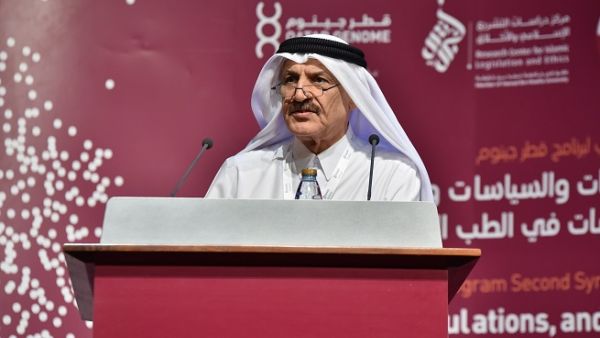Qatar Genome Programme Symposium Concludes With Discussions on Genetic Counseling and Ethics

Qatar Genome Programme (QGP), a member of Qatar Foundation (QF), concluded its second symposium on genomics by highlighting the importance of genetic counselors, particularly from the perspective of Islamic ethics.
The symposium, held under the theme ‘Ethics, Regulations, and Best Practices in Genomic Medicine’, attracted more than 1,200 delegates to the Qatar National Convention Centre for two days of presentations and panel discussions.
The final day opened with a panel on the role of genetic counselors in Qatar and internationally. Genetic counselors combine scientific expertise with education skills to clearly and compassionately discuss genetic health issues with patients.
Professor Asmaa Al Thani, Chairperson of the Qatar Genome Programme Committee and Board Vice Chairperson of Qatar Biobank, said: “We cannot lose sight of the human element of genomic research. Genetic counseling is a key element to making sure our patients have access to the best possible care and receive the information they need to make decisions about their health.”
QGP recently partnered with Qatar University on the launch of a degree program in genomic counseling.
Dr Mohammed Ghaly, Professor of Islam and Biomedical Ethics, and Academic Director at the Center for Islamic Legislation & Ethics, a member of Hamad bin Khalifa University’s College of Islamic Studies, stressed the important role genetic counselors could play in the context of Islamic ethics.
“Biomedical scientists and Islamic scholars both come at the issue of genetic counseling from their points of view, and some aspects of genetic counseling are more controversial than others,” he said. “Of course, when genomic testing finds a life-threatening condition for which there is treatment, we are obligated to tell the patient. In other cases, such as paternity issues, these things should not be reported. What is in between is where we must continue to have these discussions.”
Dr. Khalid Al-Ali, Director of Higher Education Institutions Affairs Department at Qatar’s Ministry of Education and Higher Education, moderated a panel discussion on Islamic Bioethics, which presented an overview of incidental findings in genetic counseling from an Islamic perspective.
Other speakers presenting on the closing day included: Dr Gemma Chandratillake, Education and Training Lead at East of England Genomic Medicine Centre; Dr Tawfeg Ben-Omran, Head of Clinical and Metabolic Genetics at Hamad Medical Corporation; Dr Ayman Shabana, Associate Research Professor at Georgetown University in Qatar; and Dr Abdelmajid Najar, Board Member of the World Federation of Muslim Scholars.
The symposium was held in collaboration with the Ministry of the Public Health and the Research Center for Islamic Legislation and Ethics.
Background Information
Qatar Foundation
Qatar Foundation (QF) is a non-profit organization made up of more than 50 entities working in education, research, and community development.
Our unique ecosystem—supported by partnerships with leading international institutions—is built on initiatives that address our most pressing challenges, create global opportunities, and empower people to shape our present and future.






